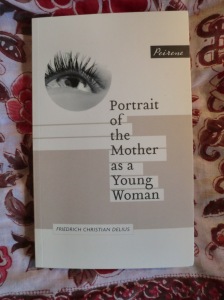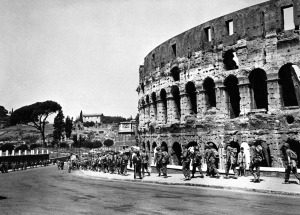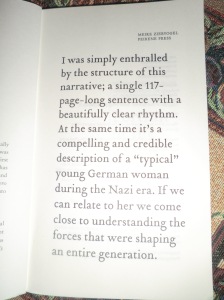 This 117 page long single sentence in a novella, is the third and final book in the Peirene Press series entitled Female Voices: Inner Realities.
This 117 page long single sentence in a novella, is the third and final book in the Peirene Press series entitled Female Voices: Inner Realities.
If you missed the first two, you can read my reviews here:
Beside the Sea by Véronique Olmi (translated from French by Adriana Hunter)
Stone in a Landslide by Maria Barbal (translated from Catalan by Laura McGloughlin and Paul Mitchell)
In my previous review I mention the enticing page at the beginning of all Peirene books where publisher Mieke Ziervogel shares what drew her to choosing this book for translation into English.
Here is a glimpse at what she says about this book:
The book is set in Rome in 1943 when Italy and Germany remain allies during the second world war. The narrative takes place during an afternoon stroll as our young woman on the brink of becoming a mother is walking towards a Lutheran church where she will attend a classical concert.
Eight months pregnant, she is the young wife of a German solider and had been waiting for him to join her in Rome; after briefly reuniting, one day later he is redeployed to Tunisia. Alone again so soon, she walks to the Bach concert thinking about how her life has changed now as a married woman and how distant she feels from everything around her. She recalls recent memories of the short time spent with her husband wondering whether he will return to her safely or not.
 Being outside her own country, without her husband and not yet active in her role as mother, it is as if she becomes more acutely aware of who she is, there is little to distract her and she often prefers to keep to herself.
Being outside her own country, without her husband and not yet active in her role as mother, it is as if she becomes more acutely aware of who she is, there is little to distract her and she often prefers to keep to herself.
Even the friendship that naturally developed with her room-mate Ilse, she keeps in check, worrying about the implications of being associated with those whose views are more vociferous than her own, she who wishes for a quiet life.
she worried about Ilse, who rarely had a good word to say about authority that was
invested by God, about Hitler and Mussolini, only a few days ago she had said Hitler always demanded that people show no weakness, but human beings were not made like that, and Mussolini always demanded that people had to hate the enemy, but the Italians that she knew were not fond of hatred, why should they hate the English and the Americans,
fortunately Ilse had broken off at this point, perhaps out of consideration for her, because she,
the younger woman, who was always silent when national and political questions were discussed, had just for a second wondered why it was necessary to hate the British and Americans, and in the same instant this forbidden thought made her feel guilty, confused and horrified,
She is not despondent for she has a deep faith and whenever her thoughts turn towards herself she recalls that war is God’s most difficult trial, lamenting:
“God, who is love, delivers this all to us, that it may benefit us in the end,
for it was un-Christian to shed tears for one’s own misfortune and to forget the far greater misfortunes of others, the joys of life were limitless”
Her thoughts enable the reader to understand her reluctance to do anything that might jeopardise what slim chance she may have at a normal life, she dislikes that by virtue of being foreign she already stands out, the opposite of what might give her peace of mind.
Portrait of the Mother as a Young Woman is a spellbinding portrayal of one woman’s internal conversation, her method of coping with the strangeness of her environment, talking herself into maintaining a calm state of mind, rationalising why they have found themselves in this situation. Though it is a trial for her, it is not enough to prevent her dreaming of the life she wishes they were living, something that seems increasingly like a fantasy, as the probability of her husband’s return grows slimmer as each day passes.
Poignant in its simplicity, expressing that universal feminine desire for love in a safe, nurturing environment.


I was looking at this one on the Peirene press website, just not sure about the 117 page long single sentence thing. Other than that it sounds wonderful.
LikeLiked by 1 person
I didn’t find the one sentence thing a problem, but then I am an admirer of Cormac McCarthy who writes without punctuation, which puts some readers off, however I love the fluidity of prose that allows the reader to decide when and how to pause and develop their own reading rhythm. Don’t let the long sentence put you off, it’s a good read, all three in this series are well worthwhile.
How did you get on with Beside the Sea, it’s a little harrowing isn’t it?
LikeLiked by 1 person
It was harrowing but beautiful. Controversial no doubt and I shall find reviewing it hard. I could see where it was going from the first page.
LikeLiked by 1 person
I love this kind of story because it sends you back to a period of history you have not experienced and it makes you feel it through the reality of the character.
LikeLiked by 1 person
It really does Julia, and it is a perspective that is rare to find in the English language, that of an unexceptional young woman, the wife of a German solider, outside her country, feeling vulnerable and less certain.
LikeLike
This sounds really interesting but I’m afraid I won’t like it. Maybe too emotional for me but I could be wrong. I have real problems with reading about the period of WWII. It tears me up inside.
LikeLiked by 1 person
When I read this, I didn’t really feel like I was reading a war novel, this felt more like reading about someone living in exile, nothing dramatic happens after all, she walks to the concert venue, listens and is enthralled by what she hears. It is more about being the outsider, but in the context of a period in history where who you are, how you look; the language you speak etc can also make you uncomfortable. In that respect you could almost say not much has changed.
LikeLike
So true. Ok maybe I’ll give it a try.
LikeLike
I love the premise of this trio of books, Claire, and this title especially — I’ve read some wonderful things about the author, with his gift for poetic voice, female or otherwise. And here’s an enchanting title for you that I came across just today — The Dress Shop of Dreams. http://januarymagazine.blogspot.com/2015/01/new-this-week-dress-shop-of-dreams-by.html
LikeLiked by 1 person
I think you would appreciate this series Deborah, that focus on the inner voice and making the reader experience and see from another’s perspective. Thank you for the recommendation, I shall check it out!
LikeLike
You’ve answered my question in your response to Ali as I was going to ask if it took you a little while to tune into the rhythm of the prose. It sounds as though it doesn’t take long to fall in line. This seems like a quiet book, one for contemplation.
Which was your favourite of the three novellas in this series?
LikeLiked by 1 person
The rhythm of the prose was not difficult to pick up at all and possibly aided by the Peirene book design and layout, the pages are not so wide, the font a reasonable size, they really do make for easy reading by getting all of that element right, making the absorption of a literary text that much less demanding.
Do you remember reading The Mussel Feast and how that monologue fills the entire page without allowing any white space, every page fills the space from left to right and top to bottom, I recall become aware of that and flicking through the rest of the pages, astounded that it was one entire swathe of words, like a roll of continuous fabric. Portrait of the Mother provides a little more breathing space than The Mussel Feast and indeed in the story, we are outside walking after all, she is young and at the beginning of something, so there is a lightness and beauty, despite the context of war.They wouldn’t bomb Rome surely?
Of the three, well I really liked them all and all the more so for having read them as a collection, but the voice that I yearned to read more of was from Maria Barbal, the Catalan writer and her book Stone in a Landslide. I’m a bit of a sucker for a nostalgic read and the mountain village setting.
LikeLike
That’s really interesting. I do recall that section of prose in The Mussel Feast; it’s breathless, almost relentless in a way and a reflection of the daughter’s state of mind. It’s good to hear there’s more lightness and breathing space in Portrait.
Stone in a Landslide does sound wonderful, both the setting and Conxa’s voice. I missed out on this series so I’ll have to take a look later in the year.
LikeLike
This sounds extraordinary. I would think it might leaving you feeling almost breathless by the end.
LikeLiked by 1 person
Yes, quite the literal manifestation of that quote Peirene often use within their pages:
LikeLiked by 1 person
Wow , sounds amazing …i am definitely going to get this one .
LikeLiked by 1 person
Brilliant, I look forward to reading your thoughts on it!
LikeLike
Beautiful review, Claire! I love the fact that the book has a 117-page long sentence 🙂 Vintage German style – long sentences which run for pages, which the author seems to have stretched to the limit. The passages you have quoted read nicely though and so I think I would love to read that sentence. The story is very beautiful and I am glad that Peirene Press chose this book for translation. I loved your reviews of the whole ‘Female Voices’ series and I hope to read them sometime. Thanks for introducing me to some beautiful new writers and some wonderful books.
LikeLiked by 1 person
I love that quote Vishy, that made me laugh out loud, “here, read this sentence” one could say casually and lose a person for the next two hours. I didn’t know that it is a vintage German style, I do know they have extremely long words in the language as well, so it would be interesting to see the original version.
This will be a good one if you plan to do the German Lit challenge again, though I really enjoyed reading it as a part of the series of three books, together they add something more than to read them each individually, so I would recommend reading them anytime.
LikeLike
Thanks for the suggestion, Claire. I will try to read them together. I loved what you said about asking an unsuspecting person to read the sentence 🙂
LikeLike
Sounds like the kind of war narrative that makes a change from the customary frontline heroism. I noticed someone had a copy of American Sniper at work today. Oh the selling power of a gun.
LikeLike